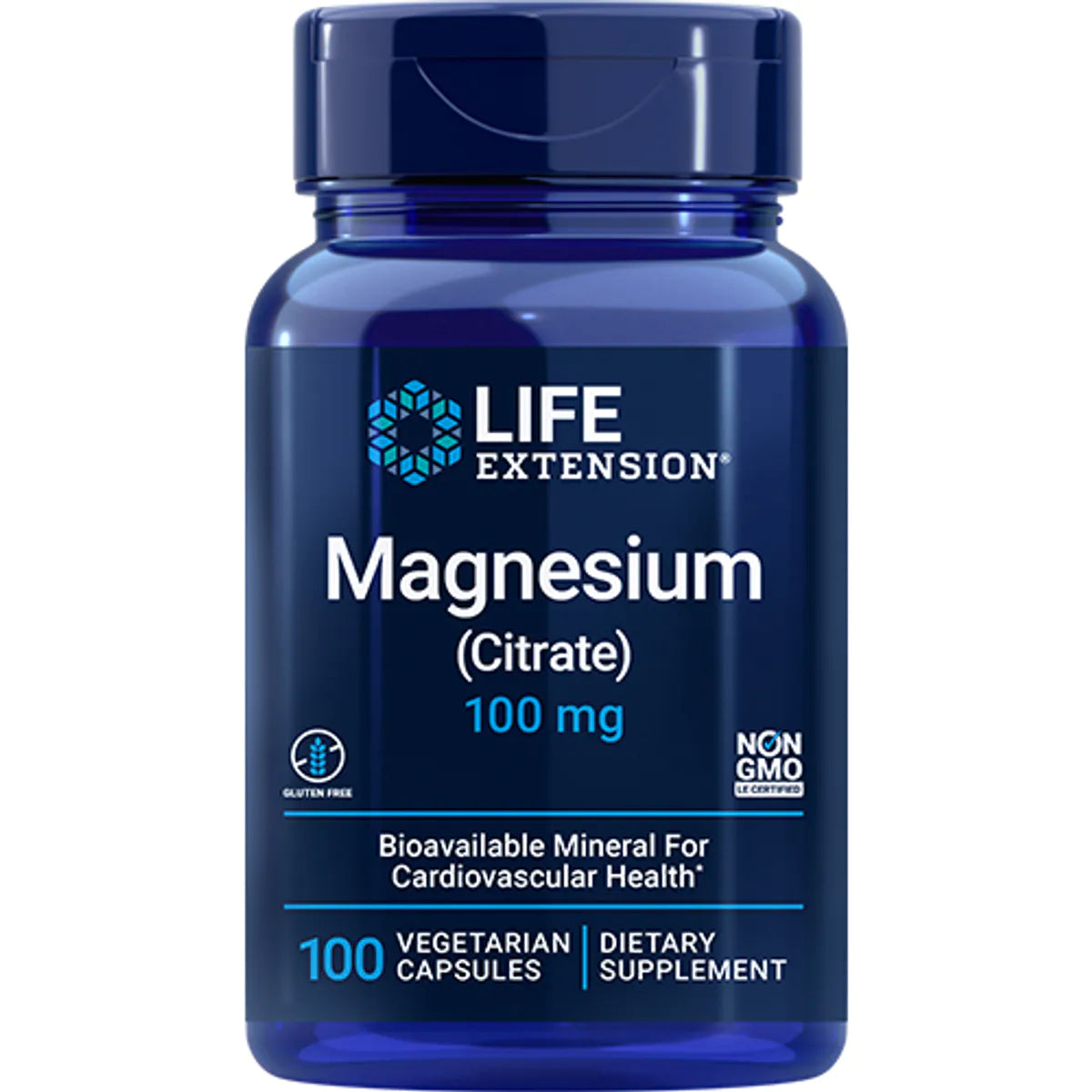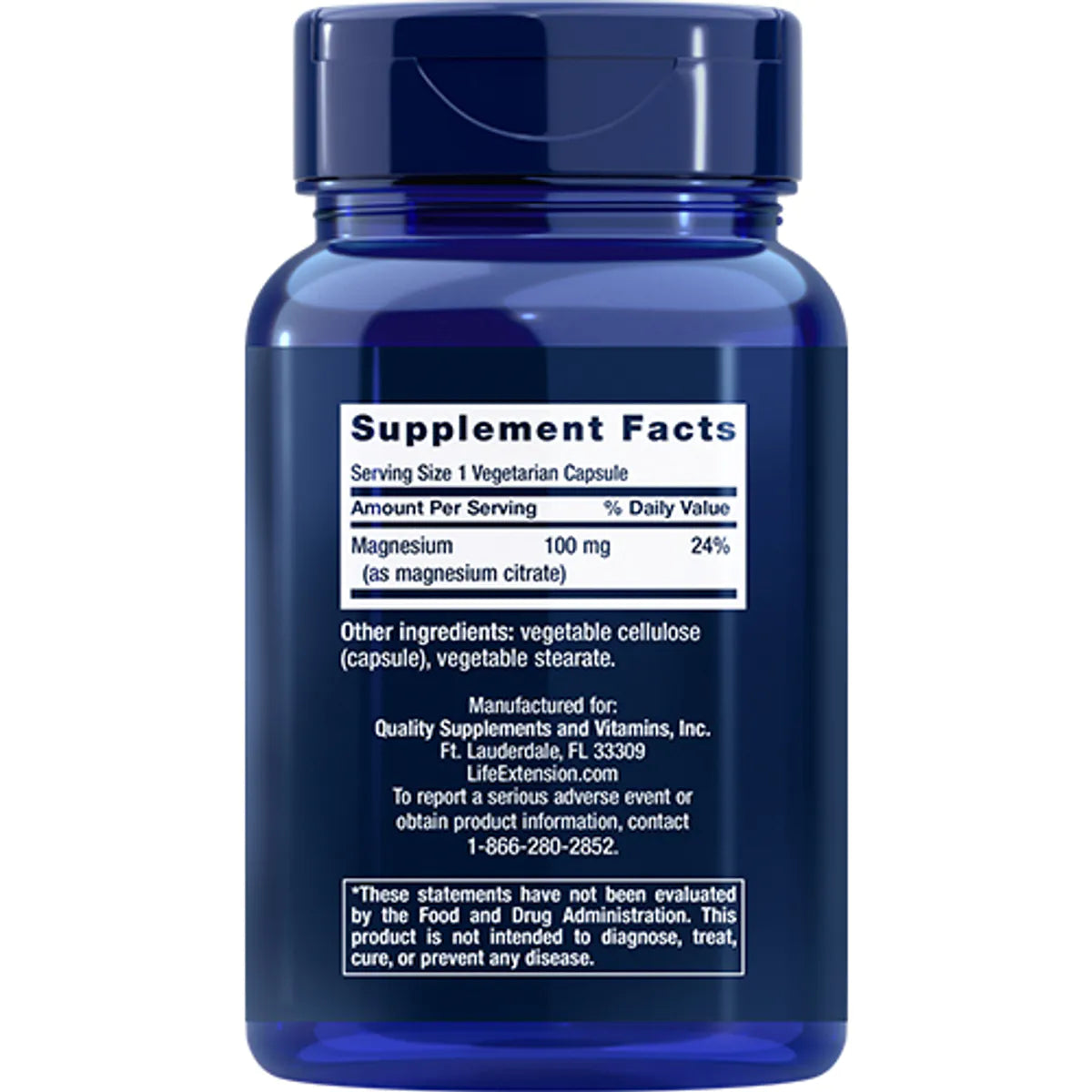Magnesium (Citrate) 100mg (100)
Magnesium (Citrate) 100mg (100) Black is backordered and will ship as soon as it is back in stock.
Magnesium Citrate 100 mg
Magnesium for heart health and strong bones
Magnesium is an essential mineral that your body depends on for more than 300 biochemical processes. It is important for maintaining normal muscle function, nerve function, heart rhythm, immune system efficiency and healthy bones. Magnesium also plays an important role in energy production and protein synthesis. However, many people do not get enough magnesium through their diet, which makes magnesium supplements essential to meet the body's needs.
Benefits of Magnesium (Citrate)
-
Heart and cardiovascular health
Magnesium is a key component in the regulation of heart rhythm, blood pressure and blood vessel elasticity. It helps promote healthy blood circulation by helping blood vessels to relax and regulating peripheral vascular resistance. Several studies show that magnesium plays an important role in maintaining healthy blood pressure levels strong bones**
Magnesium is a critical factor for bone health. It helps build a strong bone structure by supporting bone mineralization, a process that strengthens bones and helps prevent osteoporosis. The interaction between magnesium and calcium is crucial for bone health, where magnesium helps to regulate calcium absorption in bone tissue. -
Immunodeficiency function
Magnesium contributes to the proper functioning of the immune system, and promotes the body's natural defense mechanisms against diseases. Furthermore, it is important for maintaining proper muscle and nerve function, including the ability to contract and relax the muscles. This makes magnesium a deficient person who experiences muscle weakness, cramps or nervous ailments. -
Energy and metabolism
Magnesium is essential for energy production in the body, as it is involved in the formation of adenosine triphosphate (ATP), which is the body's primary source of energy. It also plays an important role in protein synthesis, making it important for muscle growth and general physical performance.
Product information
Each capsule of Magnesiumr 100 mg of elemental magnesium in a form that is easily absorbed by the body. The product is gluten-free, vegetarian and non-GMO, and provides an effective solution to ensure sufficient daily magnesium intake.
Recommended use:
Take one capsule one to three times daily, or as recommended by a healthcare professional.
Ingredients:
Magnesium citrate, vegetable cellulose (capsule), vegetable stearate.
Warnings:
High doses of magnesium can have a laxative effect. If this occurs, it is recommended to reduce the dosage or discontinue use.
Disclaimer:
This product is not intended to diagnose, treat, cure or prevent any disease. Consult a doctor before use if you are pregnant, breastfeeding or under treatment for a medical condition.
References:
- Vormann, J. "Magnesium: Nutrition and metabolism." Molecular Aspects of Medicine, 24(1-3), 2003, 27-37.
- Gröber, U., et al. "Magnesium in Prevention and Therapy." Nutrients, 7(9), 2015, 8199-8226.
- Barbagallo, M., and L.J. Dominguez. "Magnesium and aging." Current Pharmaceutical Design, 16(7), 2010, 832-839.
- Castiglioni, S., et al. "Magnesium and osteoporosis: current state of knowledge and future research directions." Nutrients, 5(8), 2013, 3022-3033.
- Rayssiguier, Y., et al. "Magnesium and the inflammatory response: Potential physiopathological implications." Archives of Biochemistry and Biophysics, 458(1), 2007, 48-56.
- Rude, R. K. "Magnesium deficiency: a cause of heterogeneous disease in humans." Journal of Bone and Mineral Research, 13(4), 1998, 749-758.
- Geiger, H., and M. Wanner. "Magnesium in disease." Clinical Kidney Journal, 5(Supplement 1), 2012, i25-i38.
- Zeng, C., et al. "Magnesium intake and serum C-reactive protein levels in the U.S. adult population." Journal of Human Hypertension, 29(6), 2015, 416-422.
- He, K., et al. "Magnesium intake and risk of coronary heart disease in men and women." Journal of Clinical Endocrinology & Metabolism, 91(10), 2006, 3752-3759.
- Altura, B.T., et al. "Magnesium deficiency exacerbates vascular endothelial dysfunction and atherogenesis: role of oxidative stress and inflammation." Journal of the American College of Nutrition, 24(6), 2005, 405S-413S.
- Veronese, N., et al. "Magnesium and health outcomes: an umbrella review of systematic reviews and meta-analyses." European Journal of Nutrition, 59(1), 2020, 263-272.
- Song, Y., et al. "Magnesium intake and the risk of type 2 diabetes: a meta-analysis." Diabetes Care, 27(1), 2004, 59-65.








